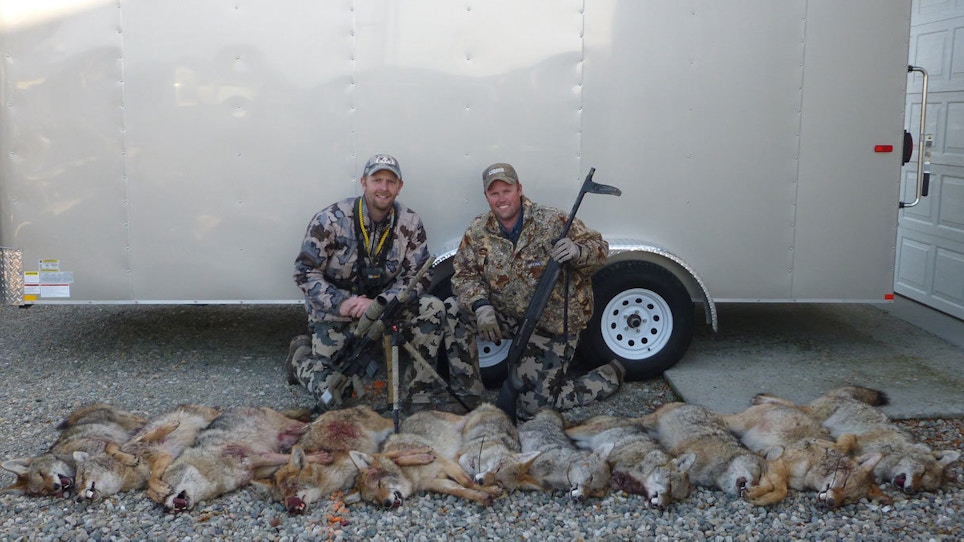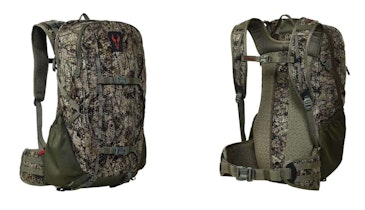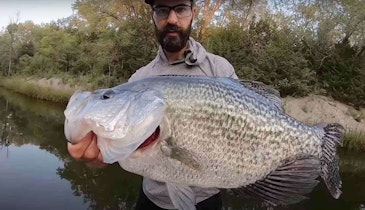It’s impossible to describe the variety of emotions you can experience at a calling contest. It takes the thrill of predator hunting up one more notch as you race the clock and match your skills against other hunters. In recent years predator-calling contests have become very popular. They’ve started springing up across the country, offering just about everyone an opportunity to participate. After competing in various contests for more than a dozen years, I’d like to share some of the things I’ve learned as well as some recommendations of things you should look for in your local contests.
Why Contests
Many of us have heard negative rhetoric surrounding coyote-calling contests. This negativity typically comes from those who don’t understand the damage coyotes can do to livestock and wild game populations if not controlled. Some try to paint contests as strictly “killing contests” while overlooking many of their primary purposes. I recall just a few years ago participating in a large contest in eastern Montana where the contest director was receiving threatening calls as a result of his involvement. Most calls came from individuals that did not understand how coyotes threaten livestock. Eastern Montana is full of humble farmers whose livelihood depends on the health of their herds of cattle and sheep. Too many coyotes without any predator control can cause tremendous challenges for these folks. I recently read that coyotes do more damage to cattle and sheep nationwide than any other predator. In many areas there are not enough hunters or predator programs to keep the coyotes under control. A sponsored hunt that brings top predator hunters to an area is just what is needed to help knock down the coyote crop. The expansion of wolves across the northwest means coyotes are becoming less of a focus for state predator control agencies. As hunters, we should be concerned with conservation. The bottom line is controlling predators helps protect our deer and antelope herds. If we can add a little excitement to our predator hunts, and bring new participants to the sport, so much the better.
In addition to helping with predator control, I personally enjoy many other facets of coyote-calling contests. Learning and hunting new areas, the thrill of competition, and the camaraderie and friendships I have developed over the years make contests an important part of my annual hunting schedule. If you enjoy predator hunting and haven’t participated in a calling contest, you should add it to your bucket list. You better watch out, because you’ll probably get hooked just like the rest of us.
Legitimate Contests
A dozen years ago it was difficult to find a coyote-calling contest; it was even harder to get invited to one. Today there are contests all over the country. In my home state of Montana, it’s easy to find a contest just about every weekend between December and March. Contests come in every size, shape and color, so it’s important to understand what you’re looking for. Rules, regulations and durations vary. Major calling contests are strictly regulated to ensure that all participants follow the same rules. Contest rules ensure a level playing field for all participants. If you’re going to travel long distances to compete in a contest, it should be fair. How many baseball games have you attended where there wasn’t at least one complaint about a missed call? Coyote contests are no different. Anytime there is competition with money and prizes involved, it’s important to keep them fair.
Please keep in mind that these are opinions I have formed over several years of participating in calling contests. I would never discourage anyone from attending any contest, but I do believe it’s important to know in advance what you’re getting into. Several years ago my close friend Colin and I attended a calling contest. We assumed it was just that, a “calling” contest. We had 24 hours of the best hunting I’ve ever experienced. We killed five coyotes and six fox in 24 hours. We were surprised to learn that another team had killed 13 critters in the same period of time. We were even more surprised to learn that they had used snowmobiles and not predator calls to harvest these animals. I have nothing against any method of coyote hunting; it’s personal preference. However, comparing coyote calling to chasing them on snowmobiles is like comparing apples and oranges. I should have better understood the rules, or lack thereof.
Here are a few things I would recommend you look for when participating in or sponsoring a coyote-calling event. First, rules should be clearly documented for all participants prior to the event. Teams should know what to expect before traveling to the hunt. Rules should also be reviewed with all teams verbally prior to the event. All coyotes harvested should be tagged with blocks or something similar, tracking the day and time each coyote was harvested. All coyotes should be temperature-tested to validate they were killed at the time reported. If a large sum of money or prizes are involved, a lie detector test should be available. Legitimate contests make the contest better for everyone. If a team has a great hunt and kills many coyotes, it validates their success. Contests are intended to build camaraderie between competitors and make it an enjoyable event for everyone.
Contest Strategies
I’m a competitive person by nature and enjoy competing in just about anything. I enjoy many aspects of calling contests, but I always want to do my best. It’s a great challenge to travel to new areas and compete with local hunters. Over the years we’ve learned some things that have helped us have success fairly consistently. Here are just a few things I believe will help you at your next contest.
Scouting is a necessity. If you don’t know where the coyotes are, you can’t call and kill them. Scouting and locating coyotes has become an essential part of every hunt for us. In fact, we typically spend more time scouting than we do hunting.
Plan more than enough stands. Planning your hunt is especially important in a contest, as every minute counts. One more stand can often make the difference between first and second place. Nothing is more aggravating than driving aimlessly trying to locate your next stand.
Plan multiple routes. We plan our routes based on several factors, including where we located coyotes, sun, wind, distance from check-in, etc. Since the weatherman cannot perfectly predict the weather, you’d better be ready for whatever Mother Nature has to throw at you.
Be flexible and follow your gut. If the coyotes aren’t coming to the call, try something different. If we call multiple stands in an area and it doesn’t produce, we move to a new area. Some areas have likely been called or the coyotes have been educated.
Plan your time and allow a little extra. I am still haunted by our arrival to the World Championships less than one minute late for a top-10 finish. You never know when you’re going to have a flat tire, need fuel, or run into traffic.
I was blessed and will always be grateful that my father introduced me to the outdoors. Hunting has been an important part of my life since I was very young. I enjoy just about any kind of hunting, but predator hunting has a special place in my heart. Every year I look forward to attending coyote calling contests around the western U.S. I look forward to seeing close friends, renewing our association, and once again stacking my skills against theirs in the field. There are many good reasons to hunt predators. A quality calling contest is just another way we can enjoy this great sport.






